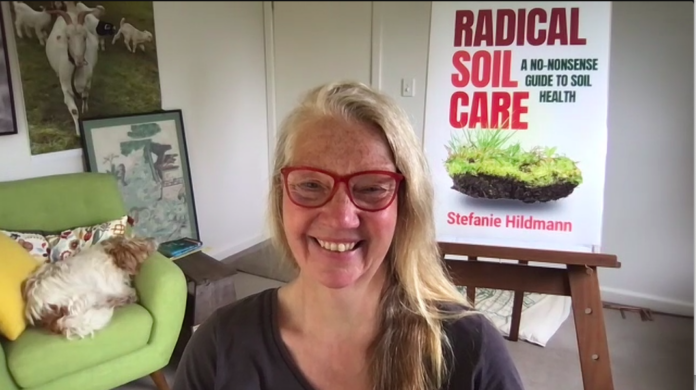Stephanie Hildmann recently published her book ‘Radical Soil Care – A No-nonsense Guide to Soil Health’.
Who is the book for? The question could be – who is it not for? Healthy soil provides the framework for all biological and physiological processes below and above ground. If we want to breathe clean air, have clean water to drink and healthy, nutrient-dense foods to eat, we all need to understand the role soil plays in this.
The book is vital for agriculture, of course, but we also need to have informed consumers who value the high-quality products only healthy soil can produce. Soil competence is important for everyone who works with soil, like gardeners, managers of sports fields, water authorities, and policymakers, the list is endless.
There is an increased understanding of the importance of Soil Health, its role in restoring a healthy environment and our health in general. Regenerative agriculture is frequently heralded as the solution to many environmental problems, yet the understanding is often patchy and the vast variety of executions confusing. That confusion in turn serves vested interests – financial and political – and hinders a wider uptake into mainstream agriculture.
‘Radical Soil Care’ takes it all back to the fundamentals of soil health in an easy-to-understand way, empowering the reader to find their own solution, asking competent questions – and keeping the bastards honest.
Stephanie works as an educator about all things soil and she is known for her no-nonsense approach to soil health. Growing up in Germany, she had the privilege to learn the fundamentals of soil health from her grandfather. Taught by his grandfather, he very well knew about the connection between soil health, animal health and ultimately human health. Stephanie learned counting by counting worms in soil samples.
Years later she had the opportunity to visit many traditionally managed properties throughout Asia as she lived in China for 10 years. There she learned many more exciting ways to support soil health and that, despite the differences in climate and soil conditions, soil truly works the same everywhere.
Stefanie often gets asked what kind of land management/agriculture she practises. For her, it is all about soil, not about labels. If she has to give it a name she would call herself a soil advocate. She likes to look at land management as having an extensive toolbox at hand and using the tools as she finds necessary, with soil health always at the centre of her considerations.
Why ‘Radical’? The original meaning of radical for many centuries was related to its origins radicalis meaning “root”. Thus, until recently, radical referred to the roots of the words, the roots of illness, or even square roots. Later, radical was used more figuratively to mean “fundamental’ and examples like “radical reform” referred to changing the very root of the system. Now radical is associated with extreme change and deviation from the norm.
_Merriam-Webster
The root of the problem lies in Soil Care, so let’s change it fundamentally to Radical Soil Care…
Stefanie Hildmann has just published her book ‘Radical Soil Care – a No-Nonsense Guide to Soil Health’. She works as a soil educator and focuses on empowerment and straightforward implementation. Stefanie lives in Victoria, Australia and speaks, teaches and runs workshops for soil health and consults – agriculture and beyond – in person and online. The book is available on RadicalSoilCare.com and contact through hello@stefaniehildmann.com.
